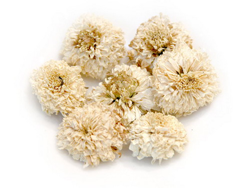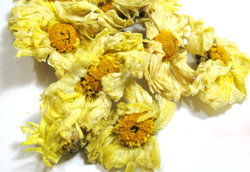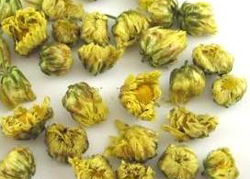Vicony Tea Directory


 |
|
| Gongju- Huangshan Tribute Chrysanthemum Tea |
Chrysanthemum Tea(菊花茶)
Chrysanthemum Tea Introduction
Chrysanthemum tea is a flower-based tisane made from chrysanthemum flowers of the species Chrysanthemum morifolium or Chrysanthemum indicum, which are most popular in East Asia. To prepare the tea, chrysanthemum flowers (usually dried) are steeped in hot water (usually 90 to 95 degrees Celsius after cooling from a boil) in either a teapot, cup, or glass; often rock sugar is also added, and occasionally also wolfberries. The resulting drink is transparent and ranges from pale to bright yellow in color, with a floral aroma. In Chinese tradition, once a pot of chrysanthemum tea has been drunk, hot water is typically added again to the flowers in the pot (producing a tea that is slightly less strong); this process is often repeated several times.

Varieties of Chrysanthemum Tea
Several varieties of chrysanthemum, ranging from white to pale or bright yellow in color, are used for tea. These include:
 |
|
| Hangju- Hangzhou White Chrysanthemum Tea |
Huángshān Gòngjú (黄山贡菊, literally "Yellow Mountain tribute chrysanthemum"; also called simply Gòngjú (贡菊)
Hángbáijú (杭白菊), originating from Tongxiang, near Hangzhou; also called simply Hángjú, (杭菊)
Chújú (滁菊), originating from the Chuzhou district of Anhui
Bójú (亳菊), originating in the Bozhou district of Anhui
Chrysanthemum buds, (胎菊), is a kind of small chrysanthemum, it's value & taste is much better than other Chrysanthemum.
Of these, the first two are most popular. Some varieties feature a prominent yellow flower head while others do not.
Chrysanthemum tea in China
Originated in the far East, chrysanthemum is either an annual or perennial herb belongs to the large genre of the daisy family.
As an important food supplement and tonic, chrysanthemum has been used in China for more than two thousand years. The Shen Nong's Canon of Materia Medica compiled before the Christian era, rated it as a superior herb the use of which prolongs life. Its central pharmaceutical properties recorded in traditional Chinese medical manuals, are, "pacifying the liver and brightening the vision, relieving fever and removing toxins".
 |
|
| Chrysanthemum Buds(胎菊) |
Cuisines with chrysanthemum flowers abound in China, especially in the south. Guangzhou (Canton) features its famous Autumn Chrysanthemum Banquet, and Nanjing (Nanking) provides serialized cuisines with chrysanthemum flowers as the principal ingredient. Chrysanthemum liquor is also very popular.
The last eight emperors of China averaged 53 years and the average life span at that time was about 50. The famous Empress Dowager Ci Xi who ruled China for 43 years however, lived 73 years, and was able to keep a young body! According to analysis, it was mainly because she adhered to a herbal diet. Of all the herb foods she loved and used chrysanthemum longevity jelly the most. During her last years she used it every day.
Modern analysis shows that chrysanthemum contains choline, vitamin A, B1, glycosides, adenine, amino acids, flavonoid, volatile oil, etc. It is said to have inhibiting effect on bacteria, including Staphylococcus aureus, Streptococcus hemolyticus B, Pseudomonas aeruginosa, Shigella dysenteriae, tubercle bacillus and dermatomycosis. It may have antivirus and antispirochete qualities, enhance capillary resistance, and it is used in Chinese traditional medicine to help cure high blood pressure, heart colic, coronary heart disease, arteriosclerosis and high cholesterol, relieve congestion, palpitation, short breath, dizziness, migraine headache, cold, flu, etc,. Regular use is believed to " lead to energetic body, better vision and hearing, alert brain and longevity".
Chrysanthemum is available in three forms, some stores just sell dried flowers, some market its extract, while some others provide herb tea with it. Now more and more people are enjoying the loving care of this "mum".
How to brew chrysanthemum tea
To prepare the tea, rinse tea cup and teapot with hot water. Use about 2 teaspoons for every 500ml of water. Infuse in hot water at 90°c (194°F) to 95°c (203°F) for 2 to 4 minutes for the first and second brewing. Gradually increase steeping time and temperature for subsequent brewing.
Nutritional Value Of Chrysanthemum Tea
| Nutrients | Amount |
| Basic Components | / |
| Protein | 1 gm |
| Water | 22.9 gm |
| Ash | 0.4 gm |
| Calories | / |
| Total Calories | 6 |
| Calories From Carbohydrate | 2.8 |
| Calories From Fat | 1 |
| Calories From Protein | 2 |
| Carbohydrates | / |
| Total Carbohydrate | 1 gm |
| Dietary Fiber | 1 gm |
| Vitamins | / |
| Vitamin C | 0.4 mg |
| Vitamin A IU | 580 IU |
| Niacin | 0.1 mg |
| Folate | 44.2 mg |
| Pantothenic Acid | 0.1 mg |
| Minerals | / |
| Calcium | 29.3 mg |
| Iron | 0.6 mg |
| Magnesium | 8.0 mg |
| Phosphorus | 13.5 mg |
| Potassium | 142 mg |
Nutrition & Health Benefits Of Chrysanthemum Tea
- Chrysanthemum tea detoxifies the blood, helps with sinus congestion and regulates high blood pressure. It can also help to calm the nerves.
- Modern researches on the tea have established that it contains choline, vitamin A, vitamin B1, glycosides, adenine, amino acids, flavonoid, volatile oil, and other nutrients.
- Chrysanthemum tea restrains the growth of bacteria in the body, such as Staphylococcus aureus, Streptococcus hemolyticus B, Pseudomonas aeruginosa, Shigella dysenteriae, tubercle bacillus and dermatomycosis.
- The Chinese medicine prescribes this tea for relief against influenza and it is also used in treating heatstroke, due to its cooling effect.
- When chrysanthemum tea is drunk with meals, it facilitates digestion, more so of greasy and oily foods. The tea is also consumed to strengthen the lungs and relieve head congestion.
- The tea is also believed to improve vision and hearing. It can be safely recommended for obese people, as it contains zero calories, when consumed without adding sugar or honey. It also doesn’t contain any caffeine.
Caution
Some individuals can experience an adverse reaction on consuming chrysanthemum and even handling chrysanthemum flowers. Mild skin irritation may result on physical handling and mild to moderate stomach upset can be experienced on consumption. Though most people do not suffer from any adverse reactions from chrysanthemum tea, it is advisable to consult a doctor before its consumption, as some herbal solutions can interact with other prescribed medications.
| Green Tea | Black Tea | White Tea | Yellow Tea | Oolong Tea | Dark Tea | Pu Erh | Scented | Flowering | Herbal | Tea Powder |
| Navigation |
| Home (ViconyTeas) |
| Tea Directory (VTD) |
| Tea Importers |
| Tea Exporters |
| Tea Wholesalers |
| Informative Tea Web |
| Tea Association |
| Tea Encyclopedia |
| Online Tea Shop |
| Tea Dictionary Online |
Copyright©2016 | chrysanthemum tea
